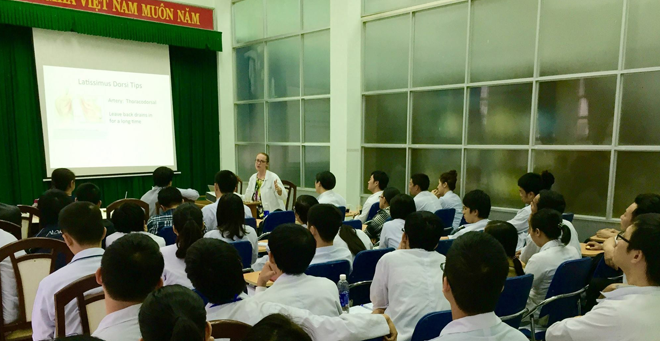 |
|
|
Joyce McIntyre, MD, presents a grand rounds with medical students and surgery residents at the Huế School of Medicine and Pharmacy in Vietnam. |
A new UMass Medical School study of international volunteering among American plastic surgeons is the first to delve into the effectiveness and quality of American surgery missions around the globe.
“Plastic surgeons have a long history of international volunteer work, but there have been no outcome-based studies among surgeons who go on these missions,” said lead author Joyce McIntyre, MD, assistant professor of surgery in the Division of Plastic and Reconstructive Surgery. “This is the first pass at trying to gain a more nuanced understanding of volunteering internationally so that we can improve those collaborations.”
Dr. McIntyre participated in her first international surgical mission while a resident at UMass Medical School, where she earned her MD and returned to after a fellowship at the University of California San Diego. She credits her medical mission experiences in several countries for her enduring interest in improving them.
“I became really curious about the complexity. All international surgery is not the same,” she said. “The motivation is always good, but the question is how to do it better. Depending on the location, different types of collaborations are most appropriate and effective.”
Identifying the best ways to deploy international health resources to provide access to safe surgical services worldwide is a global and public health priority, according to the World Health Organization, the Lancet Commission and the World Bank. An estimated 11 percent of the global burden of disease can be treated by surgery.
The study survey sent to all plastic surgeons board certified by the American Society of Plastic Surgeons garnered responses from 493 surgeons who volunteered abroad.
It found that the quality of care provided varies widely among hundreds of volunteer trips made abroad annually from the United States. While respondents reported high use of medical records, follow up care and host affiliation, the majority of respondents reported volunteering abroad outside of their scope of practice, and fewer than half reported using international safe surgery guidelines. Notably, many surgeons performing craniofacial procedures were not fellowship trained in the specialty, and most children under the age of 5 were not cared for by a pediatric anesthesiologist.
Survey questions addressing the economic challenges of undertaking international volunteer missions found that the majority of participants reported personally spending more between $1,000 and $2,000 on their last trip, while performing surgeries estimated to be worth, on average, $28,000 each. Many identified the cost of time away from their practice as a financial burden. There was also considerable overlap of trip locations among American surgeons that did not correlate with the world’s neediest locations, suggesting a significant discrepancy between supply and need.
The study also examined the educational dimension of international trips for plastic and reconstructive surgery residents; for example, the number of surgeons who bring residents with them and the differences in quality markers when residents go. McIntyre noted this analysis is timely, as the Accreditation Council for Graduate Medical Education has begun to give credits for international volunteer surgical experiences as part of residency training.
“Our core motivation in undertaking this research is one of improvement,” McIntyre and co-authors wrote. “If we have a better understanding of what is currently happening in aggregate on international plastic surgery volunteer trips, the international community of plastic surgeons can be at the forefront of improving the quality of care provided to the world’s neediest patients.”
Published online by the Journal of Plastic & Reconstructive Surgery and in the September print issue, the study will be the subject of the journal’s #PRSJournalClub Twitter discussion on Sept. 17 and 18.
Related story on UMassMedNow:
Craniofacial surgeon improving care at home and abroad for patients with a cleft